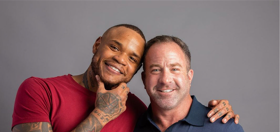
If you’re single and HIV-positive, the dating scene is more than just “Does he think I’m cute?” and “What should I wear on our second date?” It also encompasses “When do I reveal I’m positive?”
There seems to be two schools of thought when it comes to the big reveal: 1) Rip the Band-Aid off and tell a prospective suitor right away that you’re HIV-positive, so there aren’t any misconceptions or hurt down the road; or 2) Get to the know the person a bit to see if there’s a connection, and then give the news, hoping it won’t scare the person away. (There’s also Option 3 — never tell the person — which, uh, could be illegal in some places.)
And why wouldn’t some folks be reluctant to reveal their status? While some men wear their HIV on their sleeve (perhaps branding an issue of POZ magazine in their man purse), others less so. And with reason: “A study released on Wednesday by Gay Men’s Health Crisis in New York says half of Americans surveyed believe HIV/AIDS contributes to anti-gay bias — the same proportion as in 1986,” notes the Miami Herald. But what about bias from other gay men?
In group therapy, Felix González shared an incident that provoked his ire and made him feel awful. He had met a man one recent night and they agreed to have lunch the next day. When Gónzalez, 39, disclosed his status, “he automatically lost all enthusiasm of continuing the conversation.”
For González it is important to be honest upfront. However, other men with HIV believe that if the person doesn’t ask their status, it is because he would rather not know.
”It is a struggle for them, because on the one hand they want to be responsible, but on the other they want to protect themselves from breaching confidentiality and rejection,” said Linda Simon, the Miami Beach program’s psychotherapist.
Sure, everyone enjoys the freedom to not get involved in a relationship with a person with HIV/AIDS.
But it’s also true that some in the gay community should be more sensitive when responding to these situations and not shut out a potential friendship.
It is dreadful that from fear of rejection, someone might place another at risk, just as it is to not show compassion.



















Sampson
Although I’m HIV negative, I really don’t care what the status of my partner is: my ex-boyf was HIV positive. However, I would be slightly weirded out if someone told me their status immediately. I would consider it a bit ‘forward’. Once we knew each other a bit better, then I’d be glad for him to tell me.
Regarding sex, as long as we use condoms, I don’t need to know his status before hand. I assume everyone I sleep with could be HIV positive.
myrios123
Risk is part of every relationship. The trust and true measure of any relationship comes from the honesty of feelings and the situation. I think that if I liked someone who was positive and he liked me back, it really wouldn’t matter. I’ve dated enough to experience this.
Anthony in Nashville
Have not dated or had sex with anyone HIV+, as far as I know.
That is a piece of information I would want to know on the front end. I don’t know if that would be a deal breaker for me, as I have HIV+ friends.
rickroberts
I am HIV+. I save right of first refusal for myself. Why put myself up for rejection straight away when I may not even like the dude? I hold onto the information until I know I like the guy, but I always disclose before sex.
Really, though, we should all assume the other is HIV+ until told otherwise. And just to be clear here: HIV is not what is used to be. I am arguably healthier and better off physically, mentally, and in so many other ways than if I had never contracted the virus. It is part of the complexity of Rick now.
ChicagoJimmy
I dated a guy who was HIV+ for a while. We knew each other prior to dating, but I didn’t know his status. When we first went out he told me right away. I was saddened by his experience with others. He once told a guy and got the response, “Cool, that means I can cum in your mouth!” So I guess for me it’s really up to the guy who is poz to decide when and how to tell. We all need to keep ourselves as safe as possible and try to be a bit compassionate if our new date happens to reveal his status.
scott
“not shut out a potential friendship”.
I guess I haven’t dated enough. Most people I meet want to click right away or fugghedaboutit. It’s all or nothing.
If I was HIV pos I’d probably wait and see if we were going somewhere before disclosure. Of course, it must be disclosed before sex.
Alec
There are criminal HIV transmission statutes in the majority of states. I think only one state, CA, exempts people from nondisclosure if a condom is used; most don’t make any distinctions.
Something for those positive to keep in mind. I assume that everyone is positive; that’s the only way to be safe. But still, there’s an obligation on the part of those who know to disclose.
Tom
I have been HIV+ since 2003. What is this word “date” that you all speak of?
JoeB
@Tom: poz since ’04. I’ve also forgot what the word date means.
As much as I feel I do have the obligation to disclose, I also think it’s the obligation of those I am with to ask.
Anthony in Nashville
I would argue that regardless of your HIV status, dating is a rare thing. Hooking up is a different matter.
I was recently in a room of 20+ gay men and when we were asked if we were in a relationship or dating, nobody answered yes.
GPW
Hello? Wake Up people!
Don’t Ask, Don’t Tell, it Don’t Matter, Unsafe sex is UNSAFE.
If you are negative and are sexually active then you should ALWAYS assume that the other person is positive and may not know it, and have safe sex.
If you are positive and are sexually active then you should ALWAYS assume that the other
person could be negative and have safe sex.
If you believe that by asking or telling someone your HIV status before having casual sex
that it will somehow protect you, then you live in a fantasy land. Many people honestly believe that they are negative and they may have even had a test a few months earlier that confirms it for them. But if they had unsafe sex since that time then they could be positive and not know it.
Think about it, if they are willing to have unsafe sex with you then they most likely have had unsafe sex with someone else. So they could be positive and not know it.
scott
@Tom: LOL. But I’m serious and don’t know if ur joking. Am I old fashioned. I just want to date and then if it works out get in a monogamous relationship.
Be gentle. I wound easily. I guess I’m naive.
Eric
@Anthony in Nashville:
The plural of anecdote is not data.
Anthony in Nashville
@Eric:
You are right. I should have stated that gay men *I* know (HIV + and -) are not dating as much as they say they’d like to.
chris
@GPW:
what is safe sex? I don’t know, I never really gave much thought to safe sex (other than wearing a condom for anal sex) until I read articles about the “dangers” of oral sex. The validity of such articles are questionable, but ever since reading those and hearing “stories” I sometimes wonder if there’s such a thing as safe sex (despite my doubts, I think wearing a condom for oral is ridiculous).
bb
I think every neg. gay man should listen to Savage Love Podcast #90 (7/8/08). It has a few HIV-related stories, but one of them was about a neg. man who is interested in a pos. man. It was incredibly eye-opening for me.
GPW
@CHRIS
Good point, and I agree IMO it means wearing a condom for anal sex. There is little evidence and no proof that HIV can be transmitted orally. If it was then everyone would have it.
My point is that it is false security if someone tells you they are negative, because many people do not know there status and you should not behave any different.
Dabq
@rickroberts: The best post in this thread.
erick
My partner is confident that he got hiv from oral sex. It can happen, don’t be fooled.
Pragmatist
@Sampson: Glad to hear that you only practice safe sex, and nice to see that you don’t seem to be very judgmental.
However, one point: You wrote, “as long as we use condoms, I don’t need to know his status before hand. I assume everyone I sleep with could be HIV positive.”
I think your reasoning here is flawed, and putting you at a greater risk than you may realize. I’ll explain why.
1. Remember that condoms may have a substantial failure risk. A UNAIDS report back in 2003 estimated the failure rate in blocking HIV transmissions to be 10%. (I personally suspect that number is a bit lower with meticulous use, but I’ll use it for the sake of discussion.)
2. Now, let’s assume you’re dating young (15-22) men in New York. In 1999, the NYCHD estimated that 12% of young men who have sex with men had HIV. (The rate among men older than 22 was said to be higher, but the precise number wasn’t revealed in any of the materials I found online.)
3. If, over the course of several years, you managed to have sex with 100 men, 12 of them would be expected to have HIV.
4. Let’s say you had sex with each of your partners twice before moving on to the next guy. Then, you’ve had sex with an HIV-positive partner 24 times.
5. Of those encounters, a condom failure rate of 10% means that you were exposed to the virus an estimated 2.4 times. This doesn’t mean you were infected; but it does mean that, about twice, your sexual encounters fell into a HIGH risk category.
The above numbers result from a “blind” mating policy, i.e. if you just put a condom on and don’t ask about your partner’s status — you assumed everyone “could have” HIV.
Now, let’s change things. Let’s say that you DO ask about status before you have sex. And let’s assume your policy is only to have sex with men whose status matches yours (for this discussion, I’m assuming negative).
1. An estimated 43% of HIV-positive men don’t know they’re infected. Therefore, when you asked the 12 positive guys, 5 of them told you they were negative.
2. Of the remaining 7, I’m going to assume they were honest with you and said “yes.” I’ll choose to assume that most people wouldn’t lie about something like this.
3. Therefore, instead of having sex 24 times with a positive partner, you only had sex 14 times with positive partners.
You still have an expected 1.4 exposures. But, you slashed your own number of exposures (occasions on which you effectively had no protection against the virus) from 2.4 to 1.4, or by 42%. Just by asking.
When you don’t ask, you forfeit the ability to reduce your risk pool. You can think of it like driving. Yes, you should always assume that any car could swerve into your lane. But you’ll protect yourself better if you pay special attention to cars that are more likely to do so — cars with flat tires, drivers with cell phones, drunk drivers, etc. At the end of the day, all risk is managed the same way.
rickroberts
@Dabq: Thank you 🙂
rickroberts
@erick: Then he had a gaping open sore or swallowed a helluva a lot of cum. You can also get it from kissing if you are willing and have the energy to suck face until you have swallowed a gallon or two of saliva.
Pragmatist
@Pragmatist: Oops. It figures, I did my subtraction wrong in the last few paragraphs.
Assuming 7 men told you they were positive, you chose not to have sex with those men. Therefore, you only had sex with the *5* men who THOUGHT they were negative. That means you had sex with a positive partner *10* times, not 14 (because you slept with each guy twice).
10% of 10 is 1; therefore you reduced your exposures to the virus from 2.4 to 1.0, which is a 58% reduction in exposures, not 42%.
Sorry!
rickroberts
@Pragmatist: Do you propose that we not have sex? Or do you propose that we all just lay around and jack one another off and let that be it? While we’re at it, let’s never go out in the rain to avoid lightning. And never step foot in the ocean because of sharks. Stop driving. Never fly. Don’t eat eggs because of salmonella, beef because of e coli, or pork because of trichinosis. Stop drinking your wine, too, because you might harm your liver. I could go on, but I hope the readers get the point.
Pragmatist
@rickroberts: Uh, no. Did you read my entire post?
The point is not to avoid sex. The point is to seek information rather than turning information away. In risk management (regardless of the type of risk involved) increased information enables reduction of the ultimate exposure to risk.
Alec
@rickroberts: No, although in the early 90s there were some activists who proposed a reduction in anal sex. Personally, I think the failure rate decreases dramatically when you use condoms properly. And I think the infection rate from oral sex is minimal (and given the stigma attached to receptive anal sex among men and the reliance on self-reporting, I’m extremely skeptical about its risk).
That being said, condoms do fail and, more importantly, humans fail. Reducing your number of sexual partners with respect to anal sex will reduce your risk of exposure to HIV. There’s nothing inherently wrong with being mindful of that, for those who choose to take advantage of the information.
bbg372
Precluding one from making an informed decision by with holding information is dishonest, whether it is lying by omission, or waiting to disclose HIV.
Is it not more affirming to know that another is comfortable dating an HIV-infected person, and being in a serodiscordant relationship beforehand?
Pragmatist
@rickroberts: And as for your examples, I would say:
– Don’t seek shelter under a tree in an electrical storm
– Don’t swim when the shark reports are high
– Don’t drive drunk, don’t drive with bad brakes, etc.
– Don’t eat raw eggs
– Don’t eat raw ground beef
– Don’t eat raw pork
– Don’t drink excessively
adolf
i have dated one poz guy, he told me the first time we met. well we met in a bar and then by the end of the night we were making out, which is when he told me. he said he didnt tell every one. but for all the guys that he thought he would have sexual encounters with he told off right off the bat. IMO that is a good point to tell the other person your status. but for hookups i assume every one is, and wrap up.
stdsgirl
April is STD awareness month.
Be careful! STD cases on the rise!
A friend of mine who works for the largest STD/HIV dating == Positivefish. com == told me that the new subscribers have
increased 25% over 2008. Rising STD rate sparks online dating sites.
June
Pragmatist and GPW, thank you!
Martha
@JoeB:
I think that’s bullshit. I survived the 80’s and lost a lot of loved ones. Most of my HIV + friends don’t want to date negative guys, it’s too stressful, in one instance because he
serio-converted his lover through oral sex, yes oral sex, I know of two instance where that has happened. Several friends believe in serio-sorting. I think it’s a good idea, but if you want to take a risk you should know up front. It is your responsibility to tell your sex partner. Not play games around it. Yes of course love the one you love, but that starts with honesty. And yes always play safe and assume your partner is positive, but if it’s a date and you want to have, or think you might want to have a relationship with someone why withhold information that is or at least could be so important? Don’t shrug your responsibility.
Nico
The act of disclosure does not prevent transmission – employing harm reduction methods does. Do I personally think it is unethical not to disclose? No. Do I think it is unethical not to disclose and then knowingly put my partner at high risk of HIV transmission? Yes.
To read the full answer to the question, “Is it unethical if your HIV+ lover doesn’t disclose his status?” check out:
http://ickaprick.blogspot.com/2009/03/is-it-unethical-if-your-hiv-lover.html
[img]http://3.bp.blogspot.com/_gXZVcST2O8E/SUS2PyDhNII/AAAAAAAAAG0/JC4irZ057hw/S1600-R/MikikiAbortion.jpg[/img]
bbg372
First, it could be argued that disclosing HIV does prevent transmission, specifically in instances in which disclosure results in one choosing not to have sexual contact with an HIV-infected person.
Second, whether or not disclosure prevents transmission does not change that with holding information precludes one from making an informed decision, and is therefore, dishonest.
Pragmatist
@bbg372: As for the first point, I don’t even think it’s really debatable. I believe it can be proved mathematically, as long as you’re willing to assume: (1) that condoms have a failure rate greater than zero, and (2) that at least SOME prospective sexual partners who are HIV positive will accurately report their status. Both are reasonable assumptions.
Jim Pickett
Hmmmmm. I wouldn’t say non-disclosure is the number one issue in HIV prevention or the big challenge we all should focus on. Non-disclosure does not in and of itself pass the virus, right?. And one can only disclose one’s positive serostatus if one knows it…
Two people can engage in all kinds of sexual, intimate behavior without risking HIV transmission.
Stories like these place so much importance on serostatus disclosure and the entire onus is placed on the positive person – someone who knows they are positive..
Come on. For gay men and other men who have sex with men, it is unprotected anal intercourse between partners of serodiscordant or sero-unknown status that is the issue… and to qualify that even further, it is serodiscordant unprotected RECEPTIVE anal intercourse with an HIV positive man…. who perhaps doesn’t know his status and thinks his negative test from a year ago still holds up but in fact has just seroconverted, or with someone who has been positive for awhile and currently has a detectable viral load due to treatment failure or inadequate treatment….
Insert condoms into this last picture – is disclosure so important? Replace unprotected anal intercourse with kissing, oral sex and frottage — is disclosure critical?
If unprotected oral sex transmitted HIV — we’d all be infected.
Here is what I see as critical – helping all people with HIV to voluntarily know their status and access the appropriate, quality care and treatment they need and deserve without interruption. Success on this front is a much more important part of the ANSWER than disclosure.
When people know their status – they are likely to take steps to protect themselves and their partners. When people are in treatment with undetectable viral loads, they are rather unlikely to transmit the virus during (even) unprotected anal intercourse if no other STDs are present.
As an HIV positive man of 14 years, who has felt the pain and rejection mentioned in the article, and who is a professional in the field, I am just beyond sick and tired of an emphasis on disclosure that places an unfair burden on positive people and let’s people off the hook if they THINK they”re negative or just don’t have a clue — all with the seeming assumption that any sexual contact is risky.
Disclosure is a red herring.
Pragmatist
@Jim Pickett: I think that is a rationalization for bad behavior, and not a convincing one either.
Now, as a general matter of public health policy, I would say that you’re right; the “use a condom” and “stick to safer forms of intimacy” prescriptions both have a higher preventative value than disclosure. So, a public health agency with limited funding, speaking to an audience with limited attention spans, should probably focus on those two. Strictly as a matter of triage.
On an individual level, the same resource constraints don’t apply. Of course an individual should use condoms, and of course he should try to engage in safer forms of intimacy if possible. But that doesn’t mean he should stop there in terms of protecting himself or his partners.
If he’s negative, he should ask his partners before having sex. As I demonstrated above, even if many of his partners will falsely say “no,” some will say yes. That, combined with the fact that condoms have a statistically significant failure rate, means that seeking disclosure DOES, in fact, reduce his risk.
If a man is HIV-positive, and knows it, disclosure is even more potent, and more important. If he chooses to disclose, he empowers his prospective mate to *totally* eliminate the risk of infection for this contact. By contrast, if he keeps it a secret, he is knowingly putting his partner at a risk of conversion. That risk can be estimated by multiplying:
1.0>/b> (the known probability that HIV is present) * 0.10 (the risk of condom failure) * X (the risk of sero-converting, given one exposure to a particular viral load).
So, as an HIV-positive person who knows his status, you have the ability to completely prevent a transmission from taking place, or at least to empower your prospective partner to choose whether he wants to take a higher-than-normal risk. (And notice from the 1.0 multiplied above, the risk he’d be taking with you, even using a condom, is *FAR* greater than the risk he’d be taking by having protected sex with a random person from the population.)
I know it must be very difficult to live with this condition. But I think an HIV-positive person is in a position of relative power (informational power) that creates a moral obligation to disclose.
JaimeTame
I tell my date when I think the relationship is going somewhere.
I’m probably going to get yelled at by Pragmatist but fuck it, when having sex with random partners I just use a condom and don’t bother sayng anything else. When asked, there have been times I told the truth, there have been times I lied. But when using a rubber, I don’t feel bad about it all. My low virus level coupled with a condom solves the problem.
Anyways, I’m sure HIV would disappear off the face of the earth if individuals tried taking care of themselves rather than hoping people would take care of them for them. I apply the same criticism towards myself pre-infection.
dgz
statistics shmatistics — i know women who got preggers using a condom AND the pill.
but i certainly hope that those who are defending non-disclosure *would* disclose if asked by your intended partner. but even if s/he doesn’t, i implore you to protect him (and his family) from his stupidity. please.
and on a different point: disclosure isn’t only important to those of us who are (-), because the (+)s can be reinfected with additional strains of the disease, further taxing the immune system.
Pragmatist
@JaimeTame: No, I don’t want to yell at you; thanks for being honest about your practices.
I would ask you to reconsider your ethical certainty that it’s OK to lie to people about your status. Condoms fail, period. Every batch of condoms that rolls off the assembly line and put into boxes contains a flawed specimen, somewhere. If you’re lying to a partner about your status, you’re effectively making his health decisions for him — you’re looking at the risk of condom failure and saying “I’m comfortable with that risk” regardless of how HE feels about it.
Not Just Sure - HIV Positive
Since I’ve been hiv+ for twelve years and most of my adult life, I’ve had a great many opportunities to experiment with approaches to this very problem.
@adolf: Like the guy you dated, when I’m seeing a guy I generally wait until the issue becomes relevant (when we’re about to make out), and then I stop and spill the beans. Often this ruins “the moment,” but only rarely the whole night. Since it’s often the first time the guy I’m with has encountered the issue, it can understandably be more emotionally intense for him than for me. Still, usually I find that guys appreciate my honesty, (not to mention my smouldering good looks), and are happy to get back to making out with me after they get a chance to recover from the jarring news.
My favorite situation is when the guy already knows my status but I don’t know that he knows… Twice I’ve ended up dating guys who, unbeknownst to me, had been “warned” about my hiv status by (well meaning?) friends, making me seem all the more adorable when I awkwardly stalled the makeout session to disclose my status. Another time, just after telling a guy my status he looked at me and said, “oh well you know I’m poz, too right?!?” That was awesome! Unfortunately it only happened that once and I eventually fucked up that relationship up, too… but I digress…
Except for the guy I just mentioned, I’ve only ever been in “serodiscordant” relationships. I have not, as far as I know, “converted” anyone. I have tried to “serosort” via the interwebs – going on dates with guys who I know are already “poz”… but this has not worked well so far.
to sum up, if you’re HIV+:
1. If you can, you might try getting a friend to “warn” potential dates. This can work well as a screening process.
2. Never make out with someone (beyond kissing) without first disclosing your status. I think it’s pretty degrading to the other person to have sex with them (condom or not) without telling. (I’ll admit, I’ve done it before, but it was the wrong choice.)
3. Wait until you’re in an intimate situation and you feel things could go further, then stop and tell the guy your status. By this point you’ve obviously made it clear that you’re into him sexually, but by stopping at this stage in the game you’re showing that you care enough about him as a person to risk losing your chance to get laid. It shows honesty and opens the door to real intimate communiciation, and no matter what happens you’ll at least walk away with a clean conscience. If a guy can’t handle the situation, that’s cool… he’s just not the right guy for you.
4. Don’t discriminate against HIV- guys OR HIV+ guys. Deal with people as people first, and if it gets to the point where your HIV status is a relevant issue, then you deal with it from there. Don’t let a damned virus DEFINE YOU!
5. HIV- guys: if you want to stay negative, then presume all guys are positive and always use protection. Oh and don’t share needles with random junkies off the street.
PositivePOS
I am amused by the gay men who use internet dating sites. They post ads like: I am HIV neg, you be too. In the nothing-but-the-truth world of internet dating it seems a man’s word is “safe sex”. Even if a guy tests HVI neg this does not mean he is not carrying the virus. It takes six months for the virus to show up in the blood stream. Either a man is HIV positive and tells you so(this shows he is honest, straightforward and has integrity) or his status is unknown. There is evidence that oral sex leads to seroconversion. Even if a man is HIV positive, sperm should not be ingested, either anally or orally. Reinfection with a resistant strain of the virus, Hepatitis, Herpes etc are all complication you do not need. Positive or unknown status, kissing, caressing, frotage, there are many creative ways men can ‘date’.
Trenton
@rickroberts:
Thank you for your words, Rick! My boyfriend of three months just discovered that he is HIV+, and he hasn’t been taking it well. Testimonials like yours are very important to me, as they are helping him cope with the initial shock. As you have said here and as many of my HIV+ friends can attest, he can be healthier than he has ever been before. And the experience has actually brought us closer together.
Kismet works in mysterious ways…
Neo
Hey guys. I am HIV+ for 20 years, luckly very healthy in mind and body. I was infected when I was 20 years old in one of the very few sexual experiences I had back then.
when you decide to go on a date you are making a choice. There is a risk tied to that as well as there is a risk on everything else you do in life. no matter how much you want to stay away from it, you are incurring in a risk of dating a bipolar, a murder, an idiot, a rational bastard, a pshyco, an escort, a drug addicted, you name it… HIV + is nothing compared to so many of these stereotypes! unless you also want to ask your date if he falls in any of all these categories. no need to make a big deal out of that. even tough my BF is negative and I told him on the first date, I don’t feel any obligation whatsoever to disclose that unless there is a reason for it. As long as you have protected sex, you covered the obligation portion. If someone try to grow on you otherwise, that’s is totally uncool-move on. If someone asks you right of the bat… sounds really uncool as well and a bit insecure to me. You don’t ask that…you should protect yourself, that’s all. we are all humans and at some point in our lifes every and each one of us will have to deal with some sort of decease. that’s Planet Earth, that’s human life. unfortunately, nobody has immunity to that. Protect yourself and don’t expect nobody to do that job for you. wish you all good luck!
drewD
Hey guys, my boyfriend just revealed to me this morning that he is indeed HIV positive.
He was afraid of how I would react, which in turn made me question what was so menacing about me that made him feel insecure about my response.
We have been dating on and off for the past 2 years, and he contracted HIV during a period of time where we were not seeing one another.
We are both 19 and attend seperate colleges, which makes little time for face to face contact.
I could see the pain in his eyes as he stumbled around searching for a way to tell me.
And I felt the tears well up when he asked me if I could ever date someone HIV positive.
And look, I may be young, we both are, but to discredit our experiences as far as love and emotions relate to them would be illogical when considering that each person experience a unique set of circumstances in life, but I am in love with him.
The thought of not having him to wake up to each morning is gut wrenching to say the least, but I fear this not because of HIV, but because of other things that people face on a day to day basis, cancers, drunk drivers, food poisoning, etc.
The most important thing I have been turning over in my mind for the past 6 hours is how much I love him, and how brave he is for having the courage to tell me now.
My boyfriend is not a statistic, he is a human, and I will love him no matter what is thrown OUR way, and as far as I am concerned, regardless of my last test, less then one month ago, I am HIv+, we are all HIV+.
I spoke to my mom about the situation, and she was shocked, she said I should reconsider it, and that it was a huge risk.
But she doesn’t know what I feel for this man who has been with me through so much, she doesn’t feel his lips pressed against mine in the cold night air, she doesn’t feel his heartbeat as he sleeps with his head on my chest, she doesn’t feel my tears right now, but yet she has the nerve to muster up a suggestion as to what I should do.
I need help in doing some “damage control”, which really isn’t the appropriate term I am looking for, but I can’t really think right now. I want to be 100 percent truthful with her, but at the same time let her know that this isn’t about me, her son putting himself at risk for HIV, but it is the love and honor between two people who have grown so strong and beautifully together.
galefan2004
@drewD: Awesome story. Your mom is just concerned about you. Rationally, I don’t think anyone chooses to be with someone that they know is HIV+. I’m sorry, but I just don’t think that its a rational decision. HOWEVER, love is not rational. If love was rational this would be a very boring place. You only have one life to live, and that means you should do what you feel is right while living it. The truth is that HIV can be lived with. Its not the death sentence it used to be. They are also making progress on an eventual cure.
What you need to do is research the subject. While living with a man that is HIV+ is definitely a risk factor, you can still have “safer sex” and help to limit your risk. You need to give as much information to your mother as possible so that she can at least feel like she has some actual knowledge about the situation. Knowledge is power.
I don’t envy you by any means. I mean, I can’t imagine what would happen if someone I cared about told me they were HIV+. Its a hard choice to actually make. In the end, just make sure you are making that choice you and not for anyone else (don’t let your mom or even your man influence your decision).
If you can handle watching day time soap operas, General Hospital has a very good storyline between Patrick and Robin who love each other, are married, and even have a baby although she is HIV+.
The Gay Numbers
I would dump any guy who did not tell me his HIV status early on in our dating. It is likely I would dump him for being HIV positive anyway, but I would definitely dump him for l ying by omission. I have very little sympathy for the positions being conveyed here about HIV status. Your behavior, if you are HIV positive, and not telling others that you are while a) having sex with them or b) allowing a relationship to happen without telling them is reprehensible. You don’t deserve with such behavior to find anyone.
Neo
it is amazing how people still are hooked up on the moral side of the HIV. we are all humans. the chances of something happen to any of us is 50%. Yes and No.
there is so much ignorance about this matter that it really feels that finding someone that could give a little bit of thinking outside their own little world has become really challenging. it is really cool to see a young guy like yourself going outside your world to try to understand what else is there. Think about this example. When you find out that you are a gay man, you dont go out there telling everybody what you are. It takes time for you to build your comfort level and trust before you can start talking about that. And most of the time, you try to look a “normal” straigth person for you not to be judged. If you have herpes on your lips, you also don’t mentioned that to someone you’ve just met – “oh.. I have herpes on my lips.. so be aware that you may be infected if you kiss me” HIV works the same way. I am sure if your bf loves you he would never expose you to any sort of risk. When you connect with someone, you don’t connect with that person’s body. you connect with the soul. Congratulations for your accomplishment and wish you great moments and a great life with your bf. take care.
Nunkie
I think when people are about to have sex its both their responsibility to take precautions, you can never place your life in someone elses hands and then feel betrayed when they dont take care of it as you would personaly do, if you dont use a condom chances are, you will get infected you are responsible for your own life.
Although i think if you are hiv+ and you feel you are in a relationship that could grow into something beautiful why kill it by not being honest with your partner, as you get to know a person you will learn if they will reject you or not,and chances are the person who rejects you was not genuine anyway.